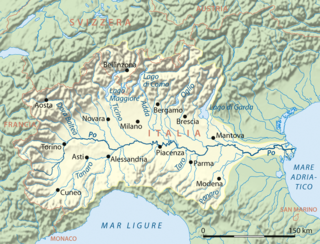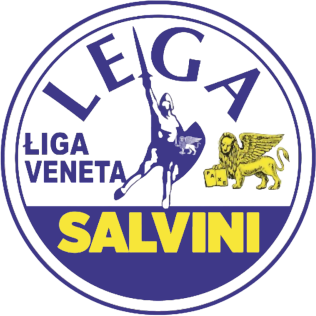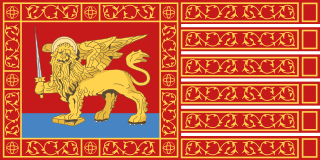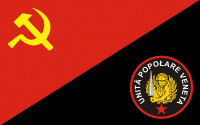
Padania is an alternative name and proposed independent state encompassing Northern Italy, derived from the name of the Po River, whose basin includes much of the region, centered on the Po Valley, the major plain of Northern Italy.

Liga Veneta Repubblica is a Venetist political party in Veneto, Italy. The party maintains a mildly separatist position and campaigns for the self-government of Veneto.

Liga Veneta, whose complete name is Liga Veneta per Salvini Premier, is a regionalist political party active in Veneto.

Franco Rocchetta is an Italian politician, entrepreneur, philologist and history populariser, who is usually described as the "father" of present-day Venetian nationalism and independentism.
Achille Tramarin was an Italian Venetist politician.

Venetian nationalism is a nationalist, but primarily regionalist, political movement active mostly in Veneto, Italy, as well as in other parts of the former Republic of Venice.
Mariangelo Foggiato is a Venetist politician.
Giorgio Vido is an Italian politician. Elected to the Italian Chamber of Deputies for the Liga Veneta-Lega Nord, he left the party in 1994.

The Friuli Movement is a regionalist political party in Friuli, Italy.
Autonomists for Europe was a minor regionalist, Christian-democratic and liberal Italian political party. Founded in 2000 by splinters of Northern League as a potentially dangerous competitor, it became a rather marginal force.
The Lega Autonomia Veneta was a centre-left regionalist political party in Veneto.
The Union of the Venetian People was a Venetist political party active in Veneto.

The Venetian People's Unity is a Venetist socialist and separatist political party.

The North-East Union was a Venetist political party active in Veneto.
The Veneto Autonomous Region Movement was a Venetist political party active in Veneto.
Liga Veneta Serenissima was a Venetist political party active in Veneto.

The Venetian Most Serene Government, whose members are often referred to as Serenissimi, is a political organization active in Veneto. The group's goal is independence and self-government for Venetian lands and it is a bulwark of Venetian nationalism.
Lega Nuova was a short-lived regionalist political party active in Lombardy.
Renato Martin is an Italian politician.
The Friulian Front is a separatist political party active in Friuli, Italy.









